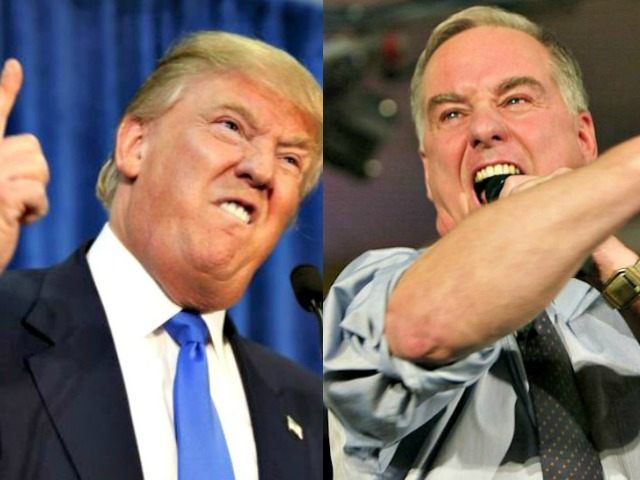Does Donald Trump have a glass jaw?
Right now, Trump is leading in every poll of Iowa voters. NBC/Wall Street Journal has Trump up seven over Senator Ted Cruz (R-TX) in Iowa. Democratic firm Public Policy Polling has trump up eight points; Monmouth has him up seven; ARG has him up seven; Quinnipiac has him up two. Nate Silver’s fivethirtyeight.com gives Trump a 48 percent chance to win Iowa, compared with a 41 percent chance for Cruz. That estimate includes Silver’s endorsement-rating system. When endorsements are removed, fivethirtyeight.com gives Trump a 59 percent chance of winning Iowa. The betting markets also heavily favor Trump.
Unless all the polling is wrong, then, Trump should win Iowa. If he does so by any significant margin, he’ll head into New Hampshire, where he has no close rival, well ahead. He could be poised to sweep the primaries.
But let’s imagine, for just a moment, that Trump loses Iowa – that the turnout doesn’t rise sufficiently to guarantee him victory, and that Cruz’s ground game ekes him to the top. What happens to Trump then?
Trump’s massive national lead could dissipate.
In 2004, Vermont Governor Howard Dean had a national lead in the polling, and it put him a close race with Massachusetts Senator John Kerry, Missouri Rep. Dick Gephardt, and North Carolina Senator John Edwards. Meanwhile, he had a massive lead in polling in New Hampshire – the Iowa caucuses took place on January 19, and the last polls before that had him up significantly on General Wesley Clark, as well as Kerry.
After he lost Iowa in a landslide to both Kerry and Edwards, Dean screamed and imploded. He didn’t win a single primary other than Vermont and the District of Columbia.
Of all recent candidates, Dean’s campaign looks most like Trump’s. He’s a volatile candidate. He relies on a populist base rather than an establishment one. He hails from the northeast and has more skittish Southern support. In 2004, the Democratic field was stacked with candidates – there were at least five major candidates in the field initially. Today, there are at least that many serious Republican candidates in the race.
Interestingly, between January 19, 2004 and January 27, 2004, the date of the New Hampshire primary, Dean actually didn’t drop that much in the polls. According to ARG, Dean had 28 percent support in their January 17-19 tracking poll; he ended up winning 26 percent. Right now, Trump sits at 31.3 percent in the Real Clear Politics poll average in New Hampshire. Trump’s biggest asset: the failure of the rest of the field to consolidate.
In 2004, Kerry jumped into the lead in New Hampshire because Dean dropped a few points – he was already within striking distance. There’s nobody within striking distance of Trump in New Hampshire because Senator Marco Rubio (R-FL), Cruz, Ohio Governor John Kasich, New Jersey Governor Chris Christie, and former Florida Governor Jeb Bush are all splitting the vote about evenly.
So it would take more than a Trump loss in Iowa to knock him down – it would take a massive bump for either Cruz or Rubio. Both of those are possible leaving Iowa; even if Trump wins New Hampshire narrowly over Cruz or Rubio, they’re rising in the polls in South Carolina. The Rubio strategy all along has been third in Iowa, second in New Hampshire, and first in South Carolina; Cruz’s strategy has been first in Iowa, third in New Hampshire, first in South Carolina. Both plans are possible if Trump loses Iowa.
If.
Even if Trump loses Iowa, there’s no guarantee he falls as Dean did. There are pundits who have compared Trump’s national lead and primary lead to that of Newt Gingrich in 2012, but that seems incorrect – Gingrich was never expected to win Iowa, and once he failed to do so, he only briefly recovered in South Carolina. Like Trump, Gingrich had an ocean-liner full of baggage – but unlike Trump, Gingrich’s poll numbers collapsed in the face of attack ads. Trump’s haven’t, at least not yet.
So Trump remains in control, at least for the moment. But Trump does have one vulnerability neither Dean nor Gingrich suffered: his entire persona is built on winning. If he takes a loss, how much does that affect how people feel about him? We may find out on Tuesday morning.
Ben Shapiro is Senior Editor-At-Large of Breitbart News, Editor-in-Chief of DailyWire.com, and The New York Times bestselling author, most recently, of the book, The People vs. Barack Obama: The Criminal Case Against The Obama Administration (Threshold Editions, June 10, 2014). Follow Ben Shapiro on Twitter @benshapiro.

COMMENTS
Please let us know if you're having issues with commenting.